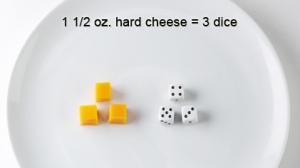Research has shown that portion control may be the most effective form of dieting when you take into account longevity and sustained weight loss and management. The reason, according to Dr. Everett Logue et al. in Obesity (http://www.nature.com/oby/journal/v12/n9/full/oby2004187a.html) may be that portion control is an easier behavioral target than planned exercise. Although increasing consumption of fruits and vegetables may be the easiest way to change behaviorally, it does not appear to be as effective in long term weight reduction.
Okay, so all I have to do is eat a little less, and move a little more. Well, it’s not that simple. If you’ve tried portion control in the past like I have, you might be rolling your eyes. Actually, 36% of women in the Illinois Women’s Health Registry are currently using portion control to lose weight, while only 20% are trying exercise. So how can we make portion control work for us? The important thing to understand is that portion sizes are often FAR LESS than we think they are. In fact, research has shown that Americans typically underestimate their caloric intake by as much as 25%. So if I think I’m only eating 1600 Calories (a typical weight loss goal), I might actually be eating 2,000. It’s also important to know that women and men of similar height and weight do NOT have the same caloric needs. Metabolism in women works differently; men generally have a higher Basal Metabolic Rate (BMR), which is the rate at which our bodies break down calories. In other words, we don’t need to eat as much as our male counterparts…sorry ladies, but try leaving that second helping to him.
So what is the correct portion size? Well we are probably all familiar with the serving size values:
1 cup green and leafy vegetables or ½ cup mashed potatoes for the veggies
½ - 1 cup of fruit or 1 oz dried fruit
½ cup rice, 1 cup (cooked) pasta, or a bagel for the grains
3 oz chicken, beef or fish for protein
1 cookie or a ½ cup ice cream for the sweets
But what do these sizes actually look like? Well, sadly, a lot less than we’d like to think. Here’s the run down:

For more portion size tips, see this cool tool at http://www.webmd.com/diet/healthtool-portion-size-plate
Even though portion control can be an effective weight loss method, it is still important to keep an active lifestyle and exercise regularly for a healthy weight AND a healthy heart! Happy and Mindful Eating!


Comments
Pages